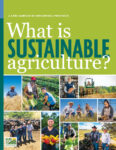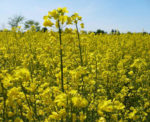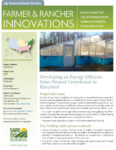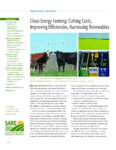The educational materials listed on this page are about Renewable Energy.
Renewable energy can address critical resource needs in agriculture as well as the challenges of climate change, which can impact agriculture in many ways. Farm energy production can contribute to overall economic viability of farms. Therefore, thinking about alternative sources, such as solar energy, geothermal energy and wind energy, is important to farm economics and sustainable practices. Using solar power, a farmer can boost on-farm energy production without dramatically raising costs. Green energy, also known as clean energy, is a viable option for combating climate change. Investing in this kind of sustainable energy on your farm operation could prove beneficial to farm finances. Geothermal power and wind power are both clean power options worth considering if a financially sound and sustainably managed farm is the end goal. Key practices include energy conservation/efficiency, energy use and consumption, byproduct utilization, renewable energy, solar energy, wind power, geothermal.
Clean Energy Farming: Cutting Costs, Improving Efficiencies, Harnessing Renewables is a bulletin SARE offers that can help farmers turn to clean energy practices on their operations, whether large or small. This will help farmers learn ways to implement farming practices that save energy, protect natural resources, and produce and use renewable fuels. For farmers who want to better understand the role of sustainable management of water in a farm system, including geothermal, check out Smart Water Use on your Farm or Ranch. SARE’s book Building a Sustainable Business aids producers in building both a sustainable and profitable business plan for their new enterprise that includes renewable energy options. The Farm Energy Topic Room provides a wealth of information on clean energy topics, including biodiesel, farm energy audits, solar and wind energy, and more.
Showing 1-7 of 7 results

What is Sustainable Agriculture?
This award-winning report provides a sampler of best practices in sustainable agriculture—from marketing and community vitality to cover crops and grazing—as well as eight profiles of producers, educators and researchers who have successfully implemented them.
Northeast Farm Energy IQ
Farm Energy IQ offers free information to help farmers enhance operational sustainability in the context of the farm economy and ecosystem.

Sustainable Production and Use of On-Farm Energy
Using solar or wind energy or producing biofuels from crop feedstocks and anaerobic digestion helps farmers achieve energy independence while improving profitability and reducing fossil fuel emissions.

Developing an Energy Efficient, Solar-Heated Greenhouse in Maryland
This project investigated the effectiveness of energy-efficient greenhouse design and the ability of water-heating solar panels to heat a greenhouse as a propane alternative.

Thermal Banking for Cold Storage
Steven Schwen's innovative energy conservation strategy uses thermal banking technology to conserve heat in his greenhouse and for cold storage.

Thermal Banking Greenhouses
Steven Schwen uses thermal banking to significantly reduce the energy costs of running a greenhouse for cold-season production.

Clean Energy Farming
Clean Energy Farming: Cutting Costs, Improving Efficiencies, Harnessing Renewables features innovative SARE-funded research and examples of farmers who are improving energy efficiency while saving money, implementing farming practices that both save energy and protect natural resources, and producing and using renewable fuels.